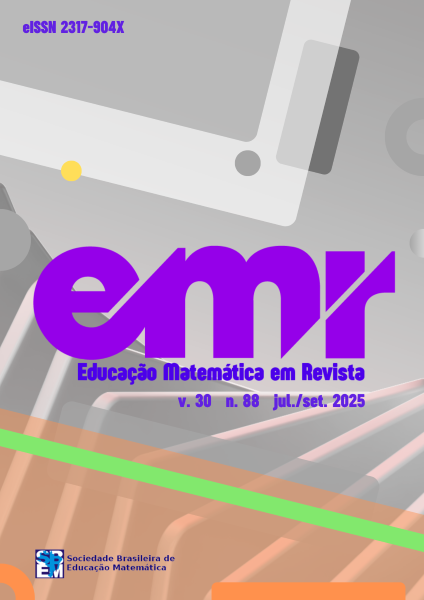ARTICULATION OF CONTEXTS IN POSTGRADUATE TEACHING IN MATHEMATICS EDUCATION: THE CASE OF PUC-SP
Keywords:
Projeto Institucional, Aperfeiçoamento da Prática Docente, Articulação de Contextos, Pós-Graduação, Educação MatemáticaAbstract
This article present results of a qualitative research on the articulation of contexts in teaching practice, developed within the scope of the Institutional Project of the Pontifical Catholic University of São Paulo (PUC-SP), whose target audience were doctoral students in Mathematics Education. The Project was promoted by the Deans of Undergraduate and Postgraduate Studies and coordinated by the Center for Teaching Improvement (CAD). Data collection was guided by a rubric and the contexts were defined based on articles published in the period 2018-2022 on historical, philosophical and research methods contexts and Mathematics Education. The good results of this approach to interlocution and articulation of contexts were evident in the engagement and interest of the students and in the quality of the work produced. The initial difficulty in distinguishing “content” from what was considered “context” disappeared, the enrichment and rigor of the analyzes were favored and the knowledge that was constructed became significant.
Downloads
References
DEWEY, J. The School and Society. In J. A. Boydston (Ed.), Middle Works of John Dewey (Vol. 1, pp. 1-109). Carbondale, IL: Southern Illinois University Press, 1899.
DEWEY, J.; CHILDS, J. The socio-economic situation and education. In W. Kilpatrick (Ed.), The educational frontier. New York: Appleton-Century, 1933.
FIGUEIREDO, A. D.; AFONSO, A. P. Context and Learning: A Philosophical Framework. In Figueiredo, A. D.; Afonso, A. P. (Eds.), Managing Learning in Virtual Settings: The Role of Context (pp. 1-22). Hershey, PA, USA: Information Science Publishing, 2006.
FIORENTINI, D.; LORENZATO, S. Investigação em Educação Matemática: percursos teóricos e metodológicos. 2 ed. Campinas: Autores Associados, 2007.
FLEMMING, D. M.; LUZ, E. F.; MELLO, A. C. C. de. Tendências em educação matemática. 2. ed. - Palhoça: UnisulVirtual, 2005. Disponível em: https://repositorio.animaeducacao.com.br/bitstream/ANIMA/22126/1/fulltext.pdf
GIMENES, N. A. S. Aperfeiçoamento em práticas docentes da contemporaneidade [Projeto CAD, PUC-SP]. São Paulo: Pontifícia Universidade Católica de São Paulo, 2022. [Manuscrito não publicado].
KUHN, T. The structure of scientific revolutions. Chicago: University of Chicago Press, 1962.
LEWIN, K.; GRABBE, P. Conduct, knowledge, and acceptance of new values. Journal of Social Issues, 1(3), 53-66, 1945.
MIGUEL, A., GARNICA, A. V. M., IGLIORI, S. B. C., D'AMBROSIO, U. A Educação Matemática: breve histórico, ações implementadas e questões sobre sua disciplinarização. Rev. Bras. Educ. (27), São Paulo, 2004.
POLANYI, M. The tacit dimension. Gloucester, MA: Peter Smith, 1996.
PONTE, J. P. A investigação em Educação Matemática em Portugal: realizações e perspectivas. In: LUENGO-GONZÁLEZ, R.; GÓMEZ-ALFONSO, B.; CAMACHO-MACHÍN, M.; NIETO, L. B. (Ed.). Investigación en Educación Matemática XII. Badajoz: SEIEM, 2008. p. 55–78.
SCHÖN, D. The reflective practitioner: How professionals think in action. New York: Basic Books, 1983.
VYGOTSKY, L. S. Mind in society: The development of higher psychological processes. Cambridge, MA: Harvard University Press, 1978.
Downloads
Published
Issue
Section
License

This work is licensed under a Creative Commons Attribution-NonCommercial-ShareAlike 4.0 International License.



